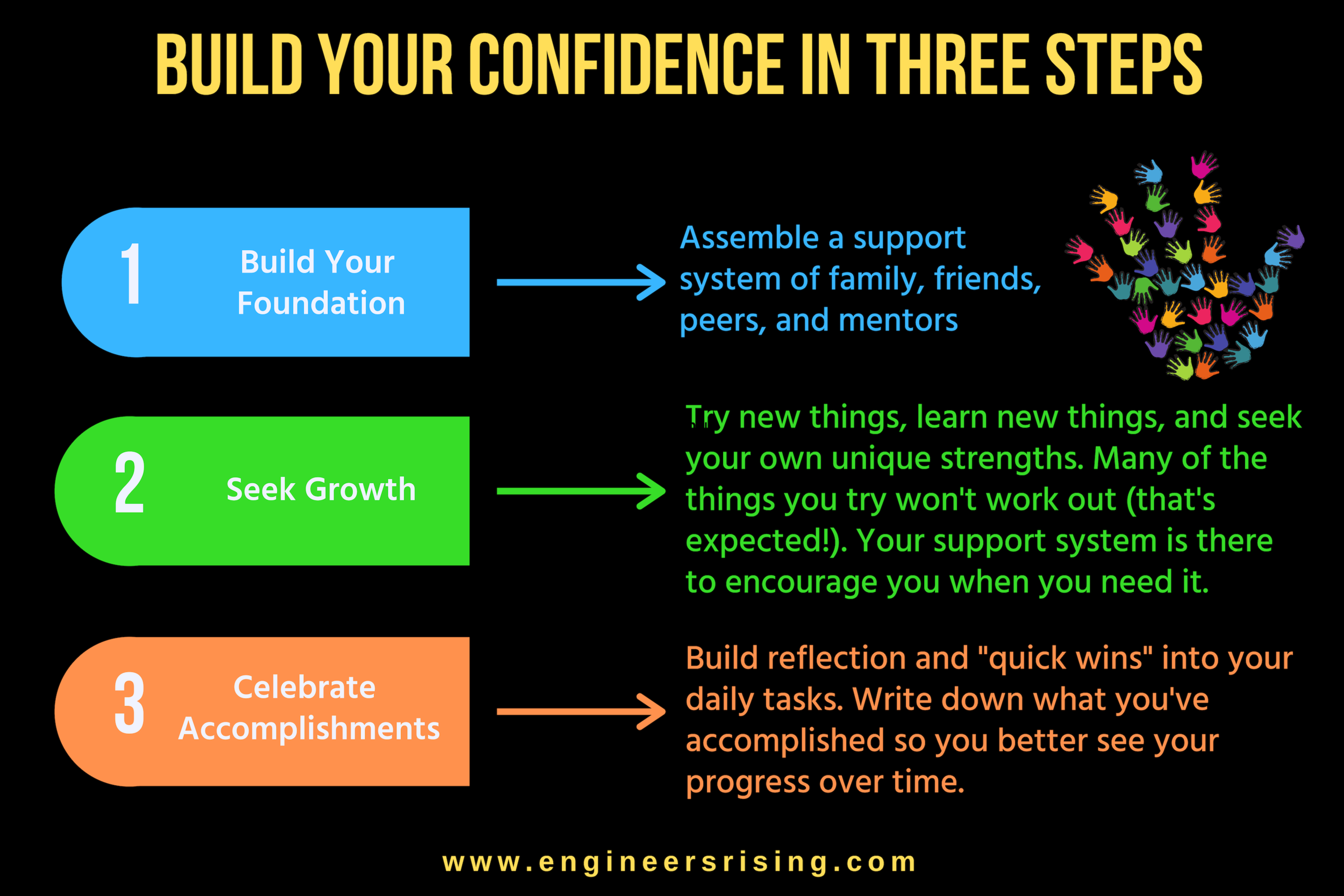Photo attribution: Christina Morillo via Pexels
Why do female engineers so often struggle with confidence – even with years of experience? What can I do if I’m struggling with being confident at work?
This is the topic of today’s blog.
Did you know we did a (free) Confidence-Building live session on June 26, 2019? Click the button above to get access to the replay.
LACK OF CONFIDENCE STARTS YOUNG, AND IT’S NOT YOUR FAULT
As children in the United States, girls are often rewarded for helping others without complaint, sitting still, and being quiet. They are rewarded for being smart, pretty, and well-behaved. They are not encouraged to take risks. “Don’t swing too high,” they are told. And later, “Don’t walk alone at night” or “a steady job is the path to success.” Girls don’t learn to take risks. Instead, they learn to ask permission.
Boys, on the other hand, are often rewarded for trying new things, and are expected to take risks, even to their own detriment. They (usually) aren’t expected to be still, be quiet, or be a peacekeeper. “Boys will be boys” we hear, when a pile of 5 year-olds are wrestling with each other in preschool. (We also hear that as an excuse for men behaving badly, but that’s a not the topic for today). Natural curiosity is encouraged, resulting in both more successes and more failures early in the life of a boy. Boys learn to take risks and take setbacks in stride at a young age.
As children grow, the children who have learned to think for themselves develop a growth mindset. A growth mindset means you can always learn something new. They believe they can learn anything if they practice often enough and have the right resources. They believe their personal intelligence and skills are not fixed, but instead learned with practice.
What happens to the children who have learned to ask permission and haven’t learned to take risks? They develop a fixed mindset. They believe that their own intelligence and skills are fixed. When they hear the word “no”, it’s taken as a personal rejection of who they are as a person. And when a boy at school says “girls aren’t good at math”, what a female child (or anyone with a fixed mindset) actually hears is “you’re dumb and will never be good at math.”
For those at you who don’t believe this still happens, let me assure you it does. My 7 year old daughter had an incident with a boy in her class in June last year who told her “since you’re a girl, I’m better than you at math. Everyone knows boys are better than girls at math.”
Confidence - or lack thereof - starts young. It’s a product of how you were raised and the society around you. Not surprisingly, an unconfident child becomes an unconfident adult.
The good news is that if you don’t have confidence, it’s not your fault.
The better news is that if you don’t have confidence, you can learn how to become confident by changing your mindset. I’ll talk about ways you can do that immediately near the end of this blog, but first we need to understand what happens at work to make our confidence levels even lower.
IMPOSTER SYNDROME IS A SYMPTOM OF LOW CONFIDENCE
Do you remember how you felt when you went on your very first job interview?
I remember being extremely nervous, constantly brushing my slightly sweaty palms against the side of my tan skirt. I have a clear recollection of exactly what I was wearing, as this interview had resulted in my first-ever professional attire shopping trip. I remember feeling very distinguished and put together in the tan skirt and jacket combo, low heels, and a crisp white-colored shirt.
I remember sitting in reception tightly clutching my portfolio containing my resume almost as if it was a lifeline. As I fidgeted in my seat, looking around at the photos on the walls of all the impressive projects this company had done, I had the distinct feeling of being an outsider. Thoughts on inadequacy filled my head. As a student with no experience at all since this was an interview for an internship, I was absolutely not qualified for ever this summer position.
The fact that I had excellent grades and decent (at least for an engineer) communication skills didn’t occur to me at the time. All I could think was that I was about to be found out as a fraud, a small-town student with nothing that qualified her to be working here, even as an intern.
That, my friends, is imposter syndrome.
Imposter syndrome is a feeling of persistent self-doubt or insecurity despite evidence to the contrary. Imposter syndrome most often strikes high-achievers, and is noted as being more common in minorities and women in male-dominated fields. And while imposter syndrome is not the same as confidence, it’s a symptom of low confidence, especially if you feel it often.
You are well-acquainted with imposter syndrome if you find yourself routinely having an internal dialogue with questions similar to the following:
“Who am I to be here?”
“I’m afraid to speak up in a meeting.”
“I’m not qualified for that promotion (o raise).”
“I don’t have enough experience to ask to work on that high-profile project”
“I must be the only one feeling overwhelmed with my current workload……so I’ll just work harder.“
“I’ll just work extra late to figure this out…..I don’t want to bother my manager with this, because surely anyone else would have been able to figure it out on their own.”
I wish I could say that my feelings of inadequacy during that first interview were simply due to lack of professional experience. I wish I could say that the feeling of being an imposter disappeared after 3, 5, 10, or 15 years working as an engineer. That hasn’t been the case for me, and it hasn’t been the case for many female (and some male) engineers. I have definitely experienced imposter syndrome less often as I’ve gained more experience, but it still flares up from time to time, especially when I’m doing something new.
Studies suggest that high achievers are particularly prone to imposter syndrome because of the impossibly high expectations they set for themselves. And, since I have yet to run into a successful female engineer who is NOT a high achiever (no matter how much she may deny it), it shouldn’t come as a surprise that this is something many female engineers feel.
Yet, the only time I heard it discussed in my professional career is in women’s conferences or forums, or an occasional blog. That makes sense. Who wants to admit they have feelings of inadequacy at work? We are encouraged – by society and many engineering work cultures - to “fake it until we make it”, or just work harder and harder until we figure it out on our own.
Choosing NOT to talk about these feelings gives them more power than they should reasonably have. If a large number of female engineers, minorities, and others that don’t fit the “stereotypical engineer” profile feel like an imposter at least some of the time at work, is that really a weakness? Or, since we know that high-achievers suffer from it much more than others, is it simply a trait of those who are destined to do great things?
I believe that imposter syndrome is simply a trait of many high achievers. The trouble is that when you combine high achievement with the subtle (and sometimes not-so-subtle) well-documented “pushback” women experience in male-dominated fields, the the feelings of imposter syndrome become more magnified. The magnified negative thoughts then further erode the high achiever’s confidence if left unchecked.
For example, a woman’s confidence is undermined every time someone wants to know what she did to succeed (implying that is unusual); how she is balancing family and kids (that question rarely if ever gets asked of a man); or how she will keep up that travel schedule when she has kids (and she doesn’t even have a boyfriend!). It’s being talked over in meetings, not invited to a social event, or being told she’s too “aggressive” while the exact same behavior in a male colleague is rewarded.
After a while, even the most confident, high-achieving woman will begin to doubt her abilities in such an environment.
So, now that we understand WHY we have a lack of confidence, how it shows up at work, and why female engineers offer suffer from it, what can you actually do about it?
HOW TO BUILD CONFIDENCE
The key to developing confidence is to allowing your innate curiosity to push yourself out of your comfort zone a little at a time, whatever that looks like for you.
That means asking questions and seeking new skills. It means doing those things that you may find deeply unsettling at first - speaking up at a meeting where you are the most junior person, giving a presentation, networking with a stranger, or asking for a high-profile project that just landed in your office.
Some will tell you that professional confidence is the same as experience, which is simply not true. The growth and fixed mindsets and the willingness to take risks begin to be established in childhood. And, while experience can help you gain confidence to some degree, if deep down you don't believe in yourself (hello, imposter syndrome!), all the experience in the world won't build confidence. This is because confidence requires a shift in what you believe about yourself.
Confidence is a mindset, a belief you have about yourself that you have the resources to figure it out.
The more you learn new things by pushing yourself out of your comfort zone, the more you start to deeply believe that you can accomplish whatever you choose. Experience will help. Having an excellent support system of peers helps. Good mentors help. Having multiple mentors as resources who will push you, provide perspective, give you honest feedback, and can sometimes serve as a technical resource will help you build confidence.
How do you know if where you are working will either help you become more confident or erode your confidence levels? Engineers I've worked with that seemed to have the most confidence were employed in a firm or a role that stretched them, offering constant opportunities for growth. The engineers that seemed to struggle with confidence were more likely to have been micromanaged in their first position (i.e. they never gained skills figuring out things for themselves) or worked in a role where they did a lot of the same things over and over again.
That means that putting yourself in a position where you can grow is critical for confidence-building.
That means we need to avoid work cultures where engineers are pigeon-holed into one technical area.
It means that we change jobs or departments if we find ourselves being micro-managed.
It means we spend as much time as we can with people who encourage our growth.
It means we put effort into surrounding ourselves with people who will support us, even if we can’t find those people at work.
It means it is particularly important to limit our exposure to negative people, to people who tell us all the reasons why something won’t work and can’t be done, and to anyone who undermines us (consciously or unconsciously) because we don’t look, act, or think exactly like a negative person believes the “stereotypical engineer” should.
It means we avoid staying in a role for too long, or becoming too comfortable in our current position, as this results in lower confidence over time.
It means we seek growth above comfort, because comfort is the status-quo and clearly the status-quo is broken.
TOOLS YOU CAN USE TO INCREASE YOUR CONFIDENCE RIGHT NOW
What can you do to start immediately building confidence? Follow the three-step process below to get started.
Step 1 is to assemble a support system. It is the foundation system for your success and confidence in both your personal and professional life. Every successful person has a support system, and what we’ve found specific to female engineers is that the women with the most robust support systems are the women who have the most successful careers. Lack of support is strongly correlated to imposter syndrome, lack of confidence, disliking your job, and even dropping out of engineering entirely. Don’t skip this step!
Step 2 is to seek growth.
Step 3 is to build celebration into your daily tasks. When you complete a priority task on your to-do list that day, pause a moment to reflect on what you’ve accomplished. Solidify the moment by taking a minute to reflect and journal on what you did and how you feel about your accomplishment. If you can’t take a quick well-deserved break to jot down a couple of notes on your phone or in a journal, reflection at the end of the work day can work too. But please, whatever you do don’t skip the step of actually writing it down!
Personal accomplishments should be included. For example, let’s say you got up early to workout, or have a goal of incorporating exercise into your day over lunch, such as taking a short minute walk. Those should be celebrated too!
Over time, you’ll start to notice trends. For myself, I noticed that I have more confidence at work on days I workout before work. I noticed that I both acted more confident and had better concentration when I took a short walk over lunch and incorporated more frequent short breaks into the day.
I also noticed that I became more mindful of how I was spending my time at work when I started writing what I accomplished down. I noticed that starting the day with getting a priority task off my plate (particularly if it involved deep thought) gave me more confidence throughout the day.
Because I documented that I was putting in the effort to grow, and reflected on it each day, over time my confidence increased and imposter syndrome lessoned. Events that would reduce my confidence or cause imposter syndrome also became more apparent, so I got in the habit of shoring up my confidence when I knew these things were coming in advance. For example, if I was giving a presentation, I made sure to schedule a workout before work.
MORE CONFIDENCE BUILDING RESOURCES
#1 Confidence-Building Hacks Livestream
On June 26, 2019, I did a live session on building your confidence that is part inspiration, part practical tools based on further research after this blog was originally posted. The replay is available when you sign up via the link below (click on the image to sign up).
#2 PODCAST INTERVIEW
I recently was interviewed on a Michelle Anderson’s Manifestor Academy for Entrepreneurs earlier this month where I talked specifically about how you can build your own confidence. You can listen in by clicking HERE.
#3 RECOMMENDED BOOKS (ALL OF WHICH I OWN!)
Looking for a more of a deep dive into building your own confidence? I’d like to share with you one of my most-used references by someone who has been helping others develop confidence for decades. This audiobook - which I’ve listened to at least six times - is called “Maximum Confidence: 10 Steps to Extreme Self-Esteem” by Jack Canfield. Here’s the link on Amazon (this is an affiliate link) if you think this may be helpful to you.
Girl, Wash Your Face is inspirational, funny, and down-to-earth. It will leave you the distinct feeling that you can do anything you decide to do, and you’ll have a number of “aha’s” as you read it and engage with Rachel’s amazing stories of success and struggle. It’s an easy read, but I’d highly recommend the audible version, which is the one I used for this book. Rachel narrates it herself, and it is and incredibly engaging listen.
This book came out following Sandberg’s Lean-In, and was one of the first books directly addressing the idea that many successful women feel less than confident. It’s written in a similar style to Lean-In, with a conversational tone packed with data and research. The book offers specific actions you can take to increase confidence, and goes in-depth as to the role confidence plays in success. For a fun fact, the TED-style talk in the live stream session (see #1) is the same one I gave at WTS 2019, following Katty Kay’s keynote address on the same subject. I was a fan of this book years before this event occurred.















